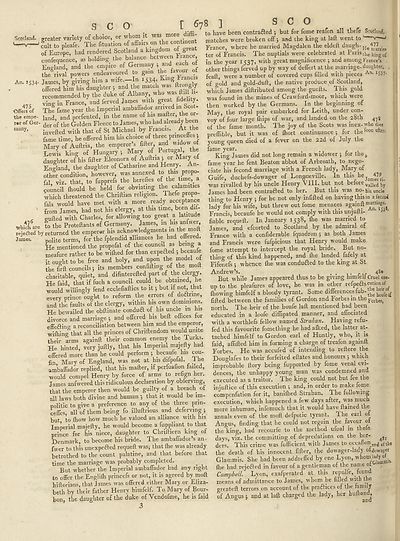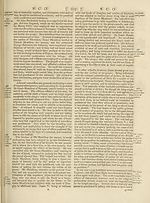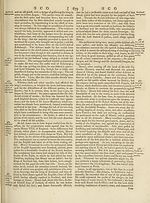Encyclopaedia Britannica, or, a Dictionary of arts, sciences, and miscellaneous literature : enlarged and improved. Illustrated with nearly six hundred engravings > Volume 18, RHI-SCR
(716) Page 678
Download files
Complete book:
Individual page:
Thumbnail gallery: Grid view | List view

SCO [
Scotland, greater variety of choice, or whom it was more
' 1 full to pleafe. The fituation of affairs on the continent
of Europe, had rendered Scotland a kingdom of great
confequence, as holding the balance between France
England, and the empire of Germany i and each of
the rival powers endeavoured to gain the favour
An i<u- James by giving him a wife.—In 1534, King I rancid
5 offered him Ms daughter ; and the match was ftrongly
recommended by the duke of Albany tv ho ft.ll li-
vino in France, and ferved James with great fidelity.
Offers of The fame year the Imperial ambafiador arrived ,n Sc„ -
the empe- ^ and prefented, in the name of his mafter, the or-
r»r of Ger- der of tJie Golden Fleece to James, who had already been
^ inverted with that of St Michael by Francis. _ At the
fame time, he offered him his choice of three pnnceffes j
Mary of Auftria, the emperor’s fifter, and widow of
Lewis king of Hungary, Mary of Portugal, the
daughter of his fifter Eleonora of Auftria 5 or Mary of
England, the daughter of Catharine and Henry. An-
other condition, however, was annexed to this propo-
fal viz. that, to fupprefs the herefies of the time, a
council ftiould be held for obviating the calamities
which threatened the Chriftian religion. Thefe propo-
fals would have met with a more ready acceptance
v from James, had not his clergy, at this time, been dil-
, gufted with Charles, for allowing too great a latitude
which6are to the Proteftants of Germany. James, in Ins anfwer,
rejeaed by returned the emperor his acknowledgments m the moft
James. poiite terms, for the fplendid alliances he had offered.
He mentioned the propofal of the council as being a
meafure rather to be wiftied for than expefted *, becaule
it ought to be free and holy, and upon the model ot
the firft councils j its members confiftmg of the molt
charitable, quiet, and difinterefted part of the clergy.
He faid that if fuch a council could be obtained, he
would willingly fend ecclefiaftics to it *, but if not, that
every prince ought to reform the errors of doftrme,
and the faults of the clergy, within his own dominions.
He bewailed the obftinate conduct of his uncle m his
divorce and marriage j and offered his belt offices for
effe&ino- a reconciliation between him and the emperor,
wiffiing'that all the princes of Chriftendom would unite
their arms againft their common enemy the lurks.
He hinted, very juftly, that his Imperial majefty had
offered more than he could perform ; becauie his cou-
ftn, Mary of England, was not at his difpofal. I he
ambaffador replied, that his mafter, if perfuafion iailed,
would compel Henry by force of arms to refign her.
James anfwered this ridiculous declaration by obiervmg,
that the emperor then would be guilty of a breach of
all laws both divine and humanthat it would be im¬
politic to give a preference to any of the three prm-
ceffes, all of them being fo illuftrious and deferving ;
but to (how how much he valued an alliance with his
Imperial majefty, he would become a fuppliant to that
prince for his niece, daughter to Chnftiern king of
Denmark, to become his bride. I he ambafl'ador’s an¬
fwer to this unexpeaed requeft was, that (he was already
betrothed to the count palatine, and that before that
time the marriage was probably completed.
But whether the Imperial ambaffador bad any right
to offer the Engliffi princefs or not, it is agreed by moft
hiftorians, that James was offered either Mary or Eliza¬
beth by their father Henry himfelf. To Mary of Bour¬
bon, the daughter of the duke of Vendofme, he is faid
3
678 ] SCO
to have been contra&ed ; but for fome reafcn all thefe Scotland,
matches were broken off j and the king at laft went to ~1
France, where he married Magdalen the eldeft daugh-He477^
ter of Francis. The nuptials were celebrated at Paris the king of
in the year 1537, with great magnificence *, and among France’s
other things ferved up by way of deffert at the marriage-daughter, .
feaft, were a number of covered cups filled with pieces An< lSS7'
of gold and gold-duft, the native produce of Scotland,
which James diftributed among the guefts. I his gold
was found in the mines of Grawford-moor, which were
then worked by the Germans. In the beginning of
May, the royal pair embarked for Leith, under con¬
voy of four large Ihips of war, and landed on the 28th
of the fame month. The joy of the Scots was inex-who dies
preflible, but it was of fhort continuance ; for the oon
young queen died of a fever on the 22d of July the
fame year. # #
King James did not long remain a widower j for thef
fame year he fent Beaton abbot of Arbroath, to nego¬
tiate his fecond marriage with a French lady, Mary of
Guife, duchefs-dowager of Longueville. In this he^47^
was rivalled by his uncle Henry \ III. but not before va]je(i ^y.
James had been contracted to her. But this was no-his uncle
thin" to Henry ; for he not only infilled on having this in afecoud
lady"1for his wife, but threw out fome menaces againft ^naEe-
Francis, becaufe he would not comply with this unjufti- 1 i ■'
liable requeft. In January 1538, (he was married to
James, and efcorted to Scotland by the admiral of
France with a confiderable fquadron ; as both James
and Francis were fufpicious that Henry would make
fome attempt to intercept the royal bride. But no¬
thing of this kind happened, and (he landed fafely at
Fifenefs ; whence ffie was conduced to the king at St
Andrew’s. . . f 480
But while James appeared thus to be giving himleli Cruel exe-
up to the pleafures of love, he was in other refpeascutionof
{bowing himfelf a bloody tyrant. Some c^^erence>s^u|3*thehoufeai
filled between the families of Gordon and Forbes in the Forbes,
north. The heir of the houfe laft mentioned had been
educated in a loofe diffipated manner, and affociated
with a worthlefs fellow named Strahan. Having refu-
fed this favourite fomething he had alked, the latter at¬
tached himfelf to Gordon earl of Huntly, who, it is
faid, affifted him in forming a charge of treafon againft
Forbes. He was accufed of intending to reftore the
Douglafes to their forfeited eftates and honours *, which
improbable ftory being fupported by fome venal evi¬
dences, the unhappy young man was condemned and
executed as a traitor. The king could not but fee the
injuftice of this execution ; and, in order to make ffime
compenfation for it, banifhed Strahan. Ihe following
execution, which happened a few days after, was much
more inhuman, infomuch that it would have ftained the
annals even of the moft defpotic tyrant. The earl of
Angus, finding that he could not regain the favour of
the king, had recourfe to the method ufual in thole
days, viz. the committing of depredations on the bor- ^
ders. This crime was fufficient with James to oceafion d 0fthc
the death of his innocent filler, the dowager-lady ofjowager
Glammis. She had been addreffed by one Lyon, whom
ffie had reje£led in favour of a gentleman of the name of
Campbell. Lyon, exafperated at this repulfe, found
means of admittance to James, w hom he filled with the
greateft terrors on account of the praaiees of the family
of Angus j and at laft charged the lady, her hufband.
Scotland, greater variety of choice, or whom it was more
' 1 full to pleafe. The fituation of affairs on the continent
of Europe, had rendered Scotland a kingdom of great
confequence, as holding the balance between France
England, and the empire of Germany i and each of
the rival powers endeavoured to gain the favour
An i<u- James by giving him a wife.—In 1534, King I rancid
5 offered him Ms daughter ; and the match was ftrongly
recommended by the duke of Albany tv ho ft.ll li-
vino in France, and ferved James with great fidelity.
Offers of The fame year the Imperial ambafiador arrived ,n Sc„ -
the empe- ^ and prefented, in the name of his mafter, the or-
r»r of Ger- der of tJie Golden Fleece to James, who had already been
^ inverted with that of St Michael by Francis. _ At the
fame time, he offered him his choice of three pnnceffes j
Mary of Auftria, the emperor’s fifter, and widow of
Lewis king of Hungary, Mary of Portugal, the
daughter of his fifter Eleonora of Auftria 5 or Mary of
England, the daughter of Catharine and Henry. An-
other condition, however, was annexed to this propo-
fal viz. that, to fupprefs the herefies of the time, a
council ftiould be held for obviating the calamities
which threatened the Chriftian religion. Thefe propo-
fals would have met with a more ready acceptance
v from James, had not his clergy, at this time, been dil-
, gufted with Charles, for allowing too great a latitude
which6are to the Proteftants of Germany. James, in Ins anfwer,
rejeaed by returned the emperor his acknowledgments m the moft
James. poiite terms, for the fplendid alliances he had offered.
He mentioned the propofal of the council as being a
meafure rather to be wiftied for than expefted *, becaule
it ought to be free and holy, and upon the model ot
the firft councils j its members confiftmg of the molt
charitable, quiet, and difinterefted part of the clergy.
He faid that if fuch a council could be obtained, he
would willingly fend ecclefiaftics to it *, but if not, that
every prince ought to reform the errors of doftrme,
and the faults of the clergy, within his own dominions.
He bewailed the obftinate conduct of his uncle m his
divorce and marriage j and offered his belt offices for
effe&ino- a reconciliation between him and the emperor,
wiffiing'that all the princes of Chriftendom would unite
their arms againft their common enemy the lurks.
He hinted, very juftly, that his Imperial majefty had
offered more than he could perform ; becauie his cou-
ftn, Mary of England, was not at his difpofal. I he
ambaffador replied, that his mafter, if perfuafion iailed,
would compel Henry by force of arms to refign her.
James anfwered this ridiculous declaration by obiervmg,
that the emperor then would be guilty of a breach of
all laws both divine and humanthat it would be im¬
politic to give a preference to any of the three prm-
ceffes, all of them being fo illuftrious and deferving ;
but to (how how much he valued an alliance with his
Imperial majefty, he would become a fuppliant to that
prince for his niece, daughter to Chnftiern king of
Denmark, to become his bride. I he ambafl'ador’s an¬
fwer to this unexpeaed requeft was, that (he was already
betrothed to the count palatine, and that before that
time the marriage was probably completed.
But whether the Imperial ambaffador bad any right
to offer the Engliffi princefs or not, it is agreed by moft
hiftorians, that James was offered either Mary or Eliza¬
beth by their father Henry himfelf. To Mary of Bour¬
bon, the daughter of the duke of Vendofme, he is faid
3
678 ] SCO
to have been contra&ed ; but for fome reafcn all thefe Scotland,
matches were broken off j and the king at laft went to ~1
France, where he married Magdalen the eldeft daugh-He477^
ter of Francis. The nuptials were celebrated at Paris the king of
in the year 1537, with great magnificence *, and among France’s
other things ferved up by way of deffert at the marriage-daughter, .
feaft, were a number of covered cups filled with pieces An< lSS7'
of gold and gold-duft, the native produce of Scotland,
which James diftributed among the guefts. I his gold
was found in the mines of Grawford-moor, which were
then worked by the Germans. In the beginning of
May, the royal pair embarked for Leith, under con¬
voy of four large Ihips of war, and landed on the 28th
of the fame month. The joy of the Scots was inex-who dies
preflible, but it was of fhort continuance ; for the oon
young queen died of a fever on the 22d of July the
fame year. # #
King James did not long remain a widower j for thef
fame year he fent Beaton abbot of Arbroath, to nego¬
tiate his fecond marriage with a French lady, Mary of
Guife, duchefs-dowager of Longueville. In this he^47^
was rivalled by his uncle Henry \ III. but not before va]je(i ^y.
James had been contracted to her. But this was no-his uncle
thin" to Henry ; for he not only infilled on having this in afecoud
lady"1for his wife, but threw out fome menaces againft ^naEe-
Francis, becaufe he would not comply with this unjufti- 1 i ■'
liable requeft. In January 1538, (he was married to
James, and efcorted to Scotland by the admiral of
France with a confiderable fquadron ; as both James
and Francis were fufpicious that Henry would make
fome attempt to intercept the royal bride. But no¬
thing of this kind happened, and (he landed fafely at
Fifenefs ; whence ffie was conduced to the king at St
Andrew’s. . . f 480
But while James appeared thus to be giving himleli Cruel exe-
up to the pleafures of love, he was in other refpeascutionof
{bowing himfelf a bloody tyrant. Some c^^erence>s^u|3*thehoufeai
filled between the families of Gordon and Forbes in the Forbes,
north. The heir of the houfe laft mentioned had been
educated in a loofe diffipated manner, and affociated
with a worthlefs fellow named Strahan. Having refu-
fed this favourite fomething he had alked, the latter at¬
tached himfelf to Gordon earl of Huntly, who, it is
faid, affifted him in forming a charge of treafon againft
Forbes. He was accufed of intending to reftore the
Douglafes to their forfeited eftates and honours *, which
improbable ftory being fupported by fome venal evi¬
dences, the unhappy young man was condemned and
executed as a traitor. The king could not but fee the
injuftice of this execution ; and, in order to make ffime
compenfation for it, banifhed Strahan. Ihe following
execution, which happened a few days after, was much
more inhuman, infomuch that it would have ftained the
annals even of the moft defpotic tyrant. The earl of
Angus, finding that he could not regain the favour of
the king, had recourfe to the method ufual in thole
days, viz. the committing of depredations on the bor- ^
ders. This crime was fufficient with James to oceafion d 0fthc
the death of his innocent filler, the dowager-lady ofjowager
Glammis. She had been addreffed by one Lyon, whom
ffie had reje£led in favour of a gentleman of the name of
Campbell. Lyon, exafperated at this repulfe, found
means of admittance to James, w hom he filled with the
greateft terrors on account of the praaiees of the family
of Angus j and at laft charged the lady, her hufband.
Set display mode to:
![]() Universal Viewer |
Universal Viewer | ![]() Mirador |
Large image | Transcription
Mirador |
Large image | Transcription
Images and transcriptions on this page, including medium image downloads, may be used under the Creative Commons Attribution 4.0 International Licence unless otherwise stated. ![]()
| Permanent URL | https://digital.nls.uk/193028015 |
|---|
| Attribution and copyright: |
|
|---|
| Description | Ten editions of 'Encyclopaedia Britannica', issued from 1768-1903, in 231 volumes. Originally issued in 100 weekly parts (3 volumes) between 1768 and 1771 by publishers: Colin Macfarquhar and Andrew Bell (Edinburgh); editor: William Smellie: engraver: Andrew Bell. Expanded editions in the 19th century featured more volumes and contributions from leading experts in their fields. Managed and published in Edinburgh up to the 9th edition (25 volumes, from 1875-1889); the 10th edition (1902-1903) re-issued the 9th edition, with 11 supplementary volumes. |
|---|---|
| Additional NLS resources: |
|

